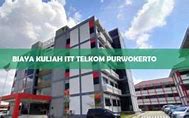
Telkom Purwokerto Dimana
Subsidiaries and investments (Telkom Group)
The "cricket ball" logo used from 1 May 1991 until 13 September 2002.
The "cricket ball" logo used from 13 September 2002 until 16 October 2009.
Logo used from 16 October 2009 until 16 August 2013.
Logo used since 17 August 2013.
PT Telkom Indonesia (Persero) Tbk, atau biasa disebut Telkom Indonesia, adalah sebuah badan usaha milik negara Indonesia yang bergerak di bidang teknologi informasi dan komunikasi. Kantor pusat resmi perusahaan ini berada di Kota Bandung, sedangkan kantor pusat operasionalnya terletak di Jakarta.[1] Hingga akhir tahun 2022, Telkom Indonesia memiliki 387 gerai Plasa Telkom yang tersebar di seluruh Indonesia untuk mendukung kegiatan bisnisnya.[4][5]
Sebelum akhir tahun 2020, perusahaan ini menggunakan nama singkatan PT Telekomunikasi Indonesia (Persero) Tbk.[6]
Perusahaan ini memulai sejarahnya pada tanggal 6 Juli 1965 saat pemerintah Indonesia membagi "PN Pos dan Telekomunikasi" (PN Postel) menjadi dua perusahaan negara (PN) terpisah, yakni "PN Pos dan Giro" untuk menyediakan layanan pos & giro dan "PN Telekomunikasi" untuk menyediakan layanan telekomunikasi.[7] Pada tahun 1974, sebagian aset perusahaan ini dijadikan modal oleh pemerintah untuk mendirikan PT Industri Telekomunikasi Indonesia (INTI) yang bergerak di bidang produksi peralatan telekomunikasi.[8] Status perusahaan ini kemudian diubah menjadi perusahaan umum (Perum).[9] Pada tahun 1991, status perusahaan ini kembali diubah menjadi persero[10] dan mulai berbisnis dengan merek "Telkom".
Pada tahun 1995, perusahaan ini mendirikan Telkomsel untuk berbisnis di bidang telekomunikasi seluler. Pada tahun 1995 juga, perusahaan ini resmi melantai di Bursa Efek Jakarta dan Bursa Efek Surabaya, mendaftarkan sahamnya di NYSE dan LSE, serta menawarkan sahamnya (tanpa melantai) di Bursa Efek Tokyo. Pada tahun 1999, perusahaan ini meluncurkan satelit Telkom-1. Pada tahun 2001, perusahaan ini membeli 35% saham Telkomsel yang masih dipegang oleh Indosat sebagai bagian dari restrukturisasi industri telekomunikasi Indonesia dengan penghapusan kepemilikan bersama dan kepemilikan silang antara perusahaan ini dan Indosat. Pada tahun 2005, perusahaan ini meluncurkan satelit Telkom-2.
Pada tahun 2010, perusahaan ini berhasil menyelesaikan pembangunan kabel serat optik bawah laut Jakarta-Kalimantan-Sulawesi-Denpasar-Makassar (JaKaLaDeMa). Pada tahun 2014, perusahaan ini menjadi yang pertama di Indonesia untuk menyediakan layanan 4G LTE. Pada tahun 2014 juga, perusahaan ini menarik diri dari LSE dan dan Bursa Efek Tokyo.[11] Setahun kemudian, perusahaan ini juga meluncurkan paket layanan IndiHome yang menggabungkan layanan internet, telepon, dan TV. Pada tahun 2016, perusahaan ini berhasil menyelesaikan pembangunan kabel bawah laut Southeast Asia-Middle East-Western Europe 5 (SEA-ME-WE 5). Setahun kemudian, perusahaan ini juga berhasil menyelesaikan pembangunan kabel serat optik bawah laut Southeast Asia-United States (SEA-US) dan meluncurkan satelit Telkom-3S.
Pada tahun 2018, perusahaan ini meluncurkan satelit Telkom-4 dan meresmikan The Telkom Hub di Jakarta. Perusahaan ini juga berhasil menyelesaikan pembangunan kabel bawah laut Indonesia Global Gateway (IGG). Pada tahun 2019, melalui Mitratel, perusahaan ini mengakuisisi 2.100 unit menara telekomunikasi milik Indosat Ooredoo dan mengakuisisi 95% saham PT Persada Sokka Tama yang memiliki 1.017 unit menara telekomunikasi. Pada tahun 2020, perusahaan ini setuju untuk menjual 6.050 unit menara telekomunikasi miliknya ke Mitratel. Perusahaan ini juga menjalin kerja sama dan berinvestasi di Gojek. Pada akhir tahun 2020, perusahaan ini mengumumkan bahwa mereka akan menyingkat namanya menjadi "PT Telkom Indonesia (Persero) Tbk", tanpa mengubah nama aslinya.[6]
Pada bulan Mei 2021, melalui Telkomsel, perusahaan ini menjadi yang pertama di Indonesia untuk menyediakan layanan 5G. Pada akhir tahun 2021, Mitratel resmi melantai di Bursa Efek Indonesia. Pada tahun 2022, perusahaan ini berhasil menyelesaikan tahap pertama dari pembangunan Hyperscale Data Center di Cikarang. Pada akhir tahun 2022, perusahaan ini meletakkan batu pertama pembangunan Hyperscale Data Center di Batam. Melalui Telin, perusahaan ini juga bergabung ke dalam konsorsium pembangunan kabel bawah laut SEA-ME-WE 6.[4][5]
Pada Penawaran saham pada 14 November 1995 dan block sale Desember 1996, komposisi saham Telkom menjadi:[12]
Per 7 Mei 1999, komposisi saham Telkom menjadi:
Per 8 Desember 2001, komposisi saham Telkom berubah menjadi:
Per 16 Juli 2002, komposisi saham Telkom berubah kembali menjadi:
Per 31 Desember 2013, komposisi saham Telkom berubah kembali menjadi:
Saat Ini, komposisi saham Telkom menjadi:[13]
Sebelum penawaran saham perdana, Telkom 100% dimiliki Pemerintah Indonesia.
Berikut ini adalah Susunan Dewan Komisaris dan Direksi PT Telekomunikasi Indonesia (Persero) Tbk berdasarkan hasil Rapat Umum Pemegang Saham Tahunan (RUPST) Telkom Tahun Buku 2022:[14]
Telkom menyediakan jasa telepon tetap kabel (fixed wireline), jasa telepon tetap nirkabel (fixed wireless), jasa telepon bergerak (mobile service), data/internet serta jasa multimedia lainnya.
Berikut adalah beberapa layanan telekomunikasi Telkom:
Serikat Karyawan Telkom (disingkat Sekar Telkom) adalah sebuah organisasi perusahaan di Indonesia. Organisasi ini merupakan wadah perjuangan para karyawan PT Telekomunikasi Indonesia, Tbk.
Berikut adalah daftar Direktur Utama Telkom Indonesia:
Melde dich an, um fortzufahren.
Indonesian telecommunications company
PT Telekomunikasi Indonesia (Persero) Tbk[2] (lit. 'Telecommunications Indonesia State-owned Public Limited Company'[2]) officially shortened into PT Telkom Indonesia (Persero) Tbk, also simply known as Telkom, is an Indonesian multinational telecommunications conglomerate[4] with its corporate headquarters in Bandung and its operational headquarters in the Telkom Landmark Complex in Jakarta.[2] Telkom is listed on the Indonesia Stock Exchange and has a secondary listing on the New York Stock Exchange—the only Indonesian company, currently listed there (but not the first—the first was Indosat, which delisted from the exchange in 2013). The government of Indonesia owns over half of the Telkom's shares outstanding.[5]
Telkom has major business lines in fixed line telephony, internet, and data communications. It is operated as the parent company of the Telkom Group, which is engaged in a broad range of businesses which consist of telecommunication, multimedia, property, and financial services.[5] Since 2008, Telkom Indonesia began changing its business, focusing on infrastructure, systems, organization and human resources, and the corporate culture, in order to face the rising competition.[6][7]
After privatization in 1995, Telkom Indonesia's total consumer base grew by 7.8% in 2010 to 129.8 million customers at the end of December 2011, making the company the nation's largest telecommunication service provider in terms of subscriber count.[3]
Telkom is one of the world's oldest telecommunication companies. The company can be traced back to the establishment of the first electromagnetic telegraph service in Indonesia on 23 October 1856, by the Dutch colonial government to connect Batavia (Jakarta) and Buitenzorg (Bogor).[8]
In 1884, the Dutch colonial government founded a private company with its headquarters in Bandung to provide postal and domestic telegraph services and, later on, international telegraph and telephony services.[9]
Telephony services had been introduced to Indonesia in 1882 by privately owned companies under a 25-year government license.
In 1906, all postal and telegraph services in Indonesia were taken over by the government as a single, unified government agency named Post, Telegraph and Telephone Service (Dutch: Post-, Telegraaf-, en Telefoondienst, PTT).[8][10]
In September 1945, roughly a month after the Indonesian proclamation of independence, the agency headquarters in Bandung was taken over by Indonesian nationalists.[10]
In December 1949, after years of national revolution war, the PTT was nationalized by the Indonesian Government as part of an Indonesian effort to oust the remaining Dutch and nationalize Dutch corporate assets.[11][12]
In 1961, PTT was converted from an official government agency into a newly established statutory corporation, the Postal and Telecommunications Services company.
Four years later, on 6 July 1965, Indonesian Government separated this company into two statutory corporations; PN Pos Giro, responsible for providing mail services and PN Telekomunikasi for telecommunications services.[13] The mail services PN Pos Giro developed over the year became the Pos Indonesia in 1995, which is still state-owned today and the official postal carrier for Indonesia's population of 230 million.[10][13]
In 1974, PN Telekomunikasi was further divided into two state-owned companies. Perusahaan Umum Telekomunikasi (Perumtel) provided domestic and international telecommunications services, while PT Industri Telekomunikasi Indonesia (PT INTI) manufactured telecommunications equipment. A further division in 1980 saw the international telecommunications business taken over by the newly nationalized PT Indonesian Satellite Corporation (Indosat).[8]
In 1991, Perumtel became a state-owned perseroan terbatas and renamed to what is now Perusahaan Perseroan (Persero) PT Telekomunikasi Indonesia or Telkom. Until 1995, Telkom's operations were organized along twelve regional operating units known as Wilayah Telekomunikasi or Witel. Each Witel had full responsibility for all aspects of business and operations in their respective regions, such as telephone services, property management, and security.[8]
In 1995, Telkom reorganized the twelve Witels into seven regional divisions and one network division. Under a series of Cooperation (KSO) Agreements, Telkom transferred the right to operate five of its seven regional divisions (I, III, IV, VI, and VII) to private sector consortia. Under these agreements, the KSO partners manage and operate the regional division concerned for a fixed term, build a specified number of fixed lines which at the end of the term, transfer the telecommunications facilities to Telkom for an agreed amount in compensation. Revenues from the KSO operations were shared between Telkom and the KSO partners.[8]
On 14 November 1995, Telkom became a privatized company when their shares went on sale through an Initial public offering on the Jakarta Stock Exchange and the Surabaya Stock Exchange (which merged in December 2007 to become the Indonesia Stock Exchange). Telkom's shares are also listed on the NYSE and the LSE, the former in the form of American depositary shares (ADSs), and were publicly offered without listing on the Tokyo Stock Exchange. Telkom is now the largest company by market capitalization in Indonesia, with a market capitalization of approximately IDR 190,512 trillion as of 31 December 2009.[8][14] The Government retains an aggregate interest of 51.19% of the issued and outstanding shares of Telkom. The Government also holds one Dwiwarna, or golden share.[8][15]
In mid-1997, Indonesia was badly affected by the Asian economic crisis.[8][16] Among those impacted were certain KSO partners, who experienced difficulties in fulfilling their obligations to Telkom. Telkom eventually acquired control of its KSO partners in Regions I, III, and VI, and amended the terms of the KSO agreements with its KSO partners in Regions IV and VII to obtain legal rights to control the financial and operating decisions of those regions.[8]
Since 5 June 2014, Telkom shares are no longer traded on the London Stock Exchange ("LSE"), and since 16 May 2014, they have ceased to be registered on the Tokyo Stock Exchange ("TSE") in Japan.[17]
Telecommunication deregulation
In 1999, Indonesia passed a deregulating telecommunication law that set in motion a sweeping array of reforms and enlivened competition policy, private investment, and long term industry direction.[16] Among the proposed reforms were the progressive elimination of the joint ownership, by Telkom and Indosat, of most of the telecommunications companies in Indonesia. This was intended to promote a more competitive market. As a result, in 2001, Telkom acquired Indosat's 35.0% stake in Telkomsel, resulting in Telkom owning 77.7% of the shares of Telkomsel, while Indosat acquired Telkom's 22.5% interest in Satelindo and its 37.7% stake in Lintasarta. In 2002, Telkom sold 12.7% of Telkomsel to Singapore Telecom Mobile Pte Ltd (SingTel Mobile), reducing Telkom's ownership of Telkomsel to 65.0%.[8]
On 1 August 2001, the Government terminated Telkom's exclusive right to provide fixed line services in Indonesia and Indosat's right to provide international direct dial services. Subsequently, Telkom's exclusive rights to provide domestic and long-distance services were terminated in August 2002 and August 2003, respectively.[8][18]
On 7 June 2004, Telkom began to provide their own international direct dial fixed line services. On 16 November 2005, the Telkom-2 satellite was launched to replace all satellite transmission services that have been served by previous satellite, Palapa B-4.[8][19]
In 2009, Telkom started transforming its business, being the only company in the field of telecommunications to transform to a broader range of business. The company expanded to telecommunications, information technology services, media and edutainment.[20] Telkom's decision to transform its business was prompted by the shift in customer lifestyles and supported by advances in technology and regulatory changes that enabled service providers to deliver enhanced service to customers.[21] With this new business transformation, Telkom also plans to conduct the acquisition of several companies that are in line with Telkom's transformation of the new business.[20][22][23]
In August 2012, the Telkom-3 satellite was lost in a launch failure, being placed into an unusably low orbit following the failure of the Briz-M upper stage of the Proton-M rocket that had launched it. Its replacement Telkom-3S successfully launched aboard an Ariane 5 rocket on 14 February 2017, 21:39 UTC.[citation needed]
In March 2019, Telkom Indonesia was one of the first Asian telco's to launch a cloud gaming service in cooperation with Gamestream.[24]
Telkom Indonesia is a dominant and largest provider of fixed line services due to owning most of Indonesia's copper network.[5] Telkom also runs telephone exchanges, trunk network and local loop connections for its fixed-line telephones. Currently, Telkom is responsible for approximately 8.3 million telephone lines in Indonesia.[5] And like most of the other state-ownership telecommunication companies in the world, Telkom is obliged to provide public services such as public call boxes.[citation needed]
Telkom Indonesia businesses are operated under government regulation by the Indonesian Ministry of Communication and Information. Telkom, as a government-owned company, is required to comply with additional obligations such as provide telecommunication services and not being discriminatory. As well as providing service in those regulated areas, Telkom has expanded into more profitable products and services where there is less government-owned-related regulation.[25]
Telkom Indonesia is the parent company of the Telkom Group, which is engaged in a wide range of businesses that consist of telecommunication, information, multimedia, property, and financial services.[5] Telkom mainly operates in fixed line telephony, internet and data communications business, while other businesses are run by subsidiaries.[citation needed]
Telkom now categorizes its portfolio into 3 Digital Business Domains:



